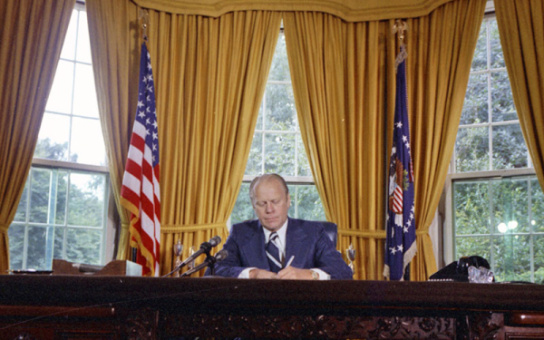
Fifty years ago, at a time of great division and turbulence in the U.S., Gerald R. Ford was sworn in as the 38th president of the United States. As part of our Ford50 commemoration, the Ford School challenged students to draft original essays on the relevance of Gerald R. Ford to today's politics. The many entries were judged by representatives of the Ford School, the Ford Presidential Foundation, and the Ford Presidential Library. Three were awarded prizes, and here, we present the winner of the top prize.
The Nixon Pardon: A Study in Integrity
Written by Kelly Rogers Victor, MPP '24, winner of the Ford50 essay contest.
As we commemorate the 50th anniversary of Gerald Ford's inauguration, we are invited to reflect upon his legacy. No decision Ford made drew more attention than that to pardon Richard Nixon. The pardon was widely reviled at the time, and then-director of the ACLU, Aryeh Neier, went so far as to comment that had Ford’s logic been invoked at Nuremberg, the Nazi leaders would have been exonerated and only their underlings left to face trial.
Yet, despite the harsh rhetoric he faced, history has been kind to Ford. Republicans and Democrats alike have since praised him for "integrity," "decency," and "selfless dedication," and as having been an "outstanding statesman [who] wisely chose the path of healing during a deeply divisive time." During Edward Kennedy's presentation of the JFK Profile in Courage award to Ford in 2001, Kennedy cited Ford's "courage and dedication" and conceded that despite his own earlier opposition to the pardon, "time has a way of clarifying past events, and now we see that President Ford was right."
What was it that became so obvious in hindsight that so few were able to identify at the time?
When Ford took office in 1974, the country was roiling in domestic and foreign policy crises—the aftermath of Watergate and erosion of public trust in government; "stagflation"—a paralyzing trifecta of slow growth, high inflation, and high unemployment; the OPEC oil embargo and soaring energy prices and gas shortages; the fall of Saigon and aftermath of the Vietnam War; ongoing Cold War tensions; and violent conflicts in Africa, Cyprus, and elsewhere. Against this backdrop, he faced the unique responsibility of deciding whether to make a disgraced, former US president stand trial—a decision involving an agonizing set of competing values: that of upholding the rule of law and restoring public trust, on the one hand, and of healing a traumatized and polarized nation, on the other. A nearly impossible choice. What was a president to do?

Consider Ford's deliberation as he later described it in his "Remarks on Signing a Proclamation Granting Pardon to Richard Nixon", in which we observe a thoughtful process involving four elements. First, an attempt at objectivity by employing his "customary policy" of careful attention to facts and the seeking out of trusted counsel. Second, identification of his own "personal sympathy"; private sentiments were something he “dare not depend on”. Third, an assessment of his duty, stemming here from his dual obligations to the American public and, as a human being, to his own conscience. Fourth, determination to the best of his ability of the likely consequences of his decision. After an agonizing deliberation during which he eschewed "public opinion polls to tell me what is right," Ford at last made his decision. And once he did, he assumed full responsibility for whatever would ensue: "the buck stops here."
Ford appreciated that there truly was no "right" answer, and, indeed, there is often no "right" answer in situations requiring moral or political decision-making. But, and this is one reason the pardon remains so relevant today, the public doesn't necessarily need the right answer. What it needs is the right process—that is, assurance that those making decisions on its behalf do so thoughtfully and with integrity, as Ford plainly did. It needs leaders who, when faced with critical decisions, take their own deliberation seriously, understand its moral import, and move slowly, taking pains about the process even, and especially, when the outcome is uncertain—which, almost all of the time, it is.
Ford appreciated that there truly was no “right” answer, and, indeed, there is often no “right” answer in situations requiring moral or political decision-making."
Political decision-making today can feel, like so many other things, too quick and easy. Our society runs on easy thought (AI), easy outrage (clickbait); easy friendships (Facebook); easy money (the Fed); easy food (McDonald’s)—easy just about everything. Ford’s pardon serves as a counterweight. We can debate whether his decision led to the best possible outcome, but we cannot fail to be moved by the thoughtfulness, integrity, and difficulty of his deliberation. These are the things for which he is remembered and respected.
The pardon offers a second lesson. It is commonplace to bemoan the hatred and vitriol that characterize modern politics. “How could you?” we shriek on X. But how different would it be were we to slow down and ask, rather, “How did you?” By which would be meant: how did you arrive at that conclusion? Which ideas, values and principles entered your mind as you formulated your view? Because it’s possible you started with concerns that aren’t that so different from my own, but from which we drew different conclusions. Process is the middle ground where we can have that conversation. When we bypass straight to easy, should we be surprised to find little common ground, dialogue, or mutual respect? Ideas feel cheap and unsatisfying and only rouse our anger.
Fifty years is an eternity in politics, yet Ford’s pardon displayed a timeless wisdom and ethos that could go a long way toward restoring our own lost trust in our government institutions and the healing of our body politic. Ford’s thoughtful reflection on Nixon’s pardon left a legacy of an enduring reminder that integrity of process matters just as much, if not more, than the outcome itself.
i Schmeck, H. (1974, September 9). Reaction to Pardon of Nixon is Divided, but Not Entirely Along Party Lines. The New York Times.
iiBush, G. W. (2007). Commemorating Gerald R. Ford, Thirty-eighth President of the United States. Retrieved from https://georgewbushwhitehouse.archives.gov/infocus/bushrecord/documents/Selected_Speeches_George_W_Bush.pdf
iii Statement from Former U.S. President Jimmy Carter on the Death of President Gerald Ford. Retrieved from https://www.cartercenter.org/news/pr/ford_122706.html
iv Clymer, Adam. (2001, May 22). Ford Wins Kennedy Award For “Courage” of Nixon Pardon. The New York Times.
v Ford, Gerald R. (1974). President Gerald R. Ford's Remarks on Signing a Proclamation Granting Pardon to Richard Nixon. Key Speeches and Writings of Gerald R. Ford. https://www.fordlibrarymuseum.gov/the fords/gerald-r-ford/key-speeches-and-writings-gerald-r-ford
Learn more
More in State & Hill
Below, find the full, formatted fall 2024 edition of State & Hill. Click here to return to the fall 2024 S&H homepage.